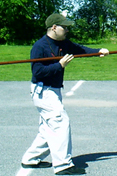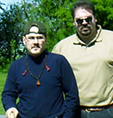|
First Strike: Can You Prevent the Inevitable?
By David W. Pearson

Many argue that the first strike, the
preemptive strike, is the key to success in any conflict. When faced
with a potentially violent situation, there are always options available
to you. You must make a choice. Should you strike first or should you let
your opponent strike you? The moment when a conflict turns to physical
violence becomes the defining moment in that conflict. The answer is not
simple. The decision is one of common sense and strategy.
You should ask yourself some questions well before you are in a position
to strike. Am I prepared to kill a man over this conflict? A human
being can die from a blow to the head caused by a simple fall from a
height of sixteen inches. Medically that is all it takes to cause death.
Are you prepared to go to jail over
this conflict? Think it can’t happen? Recently a man in my city was jailed
on manslaughter charges for striking and killing a man with a single blow.
We have all heard about single-kill blows in our studies of self defense,
so it is indeed possible to take a life with a single punch. Are you
prepared to take a life in a split-second decision?
A fight in a public place is very dangerous because of the inherent
dangers around you. Are you prepared to take on every person present? How
will you know who sides with whom when the fists start flying? A person
who starts a fight may be taking on many more people than they expect. You
should consider who might be present in that crowd. It may be your
adversary’s best friends or family, or it could be complete strangers.
Understand that you may end up fighting many more people than you
originally expected.
|
First Strike: Can You Afford
the Risks of Striking Second?
By Phil
Elmore
 Recently Recently
my local paper reported a disturbing incident. At a local bar, a
dispute over access to a pool table turned ugly. Two men got into a
“fight,” if you can call it that: One of them punched the other just
once in the jaw.
The guy who got punched died.
Just like that, from a single blow: he’s dead.
Those who advocate the preemptive strike understand the incredibly high
stakes of every physical encounter. The human body
is at once remarkably resilient and surprisingly fragile. Human
beings shot or stabbed, incurring what should have been mortal wounds,
have at times ignored grievous injury to the horror of those fighting
them. At the other end of that spectrum are incidents like this one,
in which a single, stupid, barroom fist thrown in anger left one man dead
and another charged with manslaughter.
Because our society places so much emphasis on the question of
“who threw the first punch,” preemptive strikes
represent a very legally sensitive aspect of self-defense. Only the
presence of a credible threat of harm can justify a preemptive
strike, but this is no guarantee. We will assume, in discussing such
strikes, that you have done your homework, understand the consequences,
and would only strike first if you were reasonably and credibly in
fear for your life.
So: with that said, in the presence of such a threat, what should
you do? Do you dare give your enemy the chance to hit you first?
It would certainly give you an advantage in defending your actions should
you go on to fight and defeat him.
|
|
Each time you enter a fight, you should
think very hard about defeat. You should always be prepared for the worst
while working for the best. You may find that the person you are squaring
off against is much more dangerous than you originally thought.
Underestimation of your opponent can lead to serious injury. Each time I
go into a fight or sparing session I let my opponent come to me. This
tactic allows me to watch and anticipate what my opponent is doing and
react appropriately.
Sun Tzu said: The good fighters of old
first put themselves beyond the possibility of defeat, and then
waited for an opportunity of defeating the enemy.
–
Sun Tzu, The Art of War, “IV: Tactical Dispositions“
|
Sun Tzu’s The Art Of War is
arguably the most studied text in history on the tactics and strategies of
conflict. The quote above is indicative of my philosophy on conflict as
well. Put yourself in a position beyond the possibility of defeat. Then,
wait for an opportunity to crush your enemy. It is a simple strategy, but
it is extremely effective. How many times have we heard the statement
“Fools rush in?” This is the cornerstone of most martial arts. Avoid
conflict at all cost, and when forced, destroy your enemy utterly.
I hear the argument all the time… “But what if…?” My response is the
same in most every example. Do not ever let yourself get in a situation
where you are the one to take the first strike to begin with! You have to
be a fool to sit idle while someone gears up to hit you. Be prepared for
that first strike, see it coming, and know your response before your
opponent ever considers striking.
I have taken both roles in conflicts over my lifetime. As someone who has
been both aggressor and target I have learned much by standing on both
sides of the issue. Now I believe that there is an accurate solution to
every conflict. Avoid the conflict at all cost. No one wins when violence
occurs.
Does this sound like a martialist
concept? Absolutely. You can turn the odds in your favor easily by
preparing yourself as much as possible. Isn’t that what martialism is all
about?
|
Can you go on to defeat him if
he’s killed you?
Many people respond to these hypothetical
questions with the notion that we should simply prepare ourselves and
conduct our lives in such as way as to completely avoid such scenarios,
effectively preempting the need for preemptive strikes. This
is the same logic that says, “If you’re worried about getting into bar
fights, stay out of bars.” Well, this is true, up to a point — one
should not court trouble.
One does not always get a choice, however.
Trouble, despite our best efforts, may find us anyway. No matter
how well prepared we believe ourselves to be, there will be some
eventuality we do not anticipate.
More importantly, and what those dismissing preemptive self-defense
often miss, is the problem of error. Are you perfect? Have all
the precautions you’ve always taken been successful 100 percent of the
time? Have you never made a mistake, a miscalculation, or an
honest-to-badness screw-up?
No matter how you try to avoid the need to strike first in certain
situations, you may face those very scenarios. When you do, you will
be faced with a choice: Should you strike first,
or should you let your opponent strike you before taking physical
action against him?
The tragedy I cited at the beginning of this column could be
interpreted through the lens of either philosophy. You could
theorize that the man who struck first did so out of genuine fear for his
well-being — and you would conclude that his “preemptive strike” may well
condemn him to live the rest of his life as a felon.
You could, however, theorize that the victim might well have seen the
threat coming. He might have chosen to let his opponent initiate
force, justifying retaliatory action — and that was the last choice he
ever made on this Earth.
Can you afford the risk? Can you successfully avoid every
scenario in which that risk exists?
There are no easy answers to questions like these. When facing
someone who means you harm, however, understand the very grave possibility
that the first strike in any physical altercation could be the
only strike delivered.
Choose wisely.
|


 Recently
Recently
